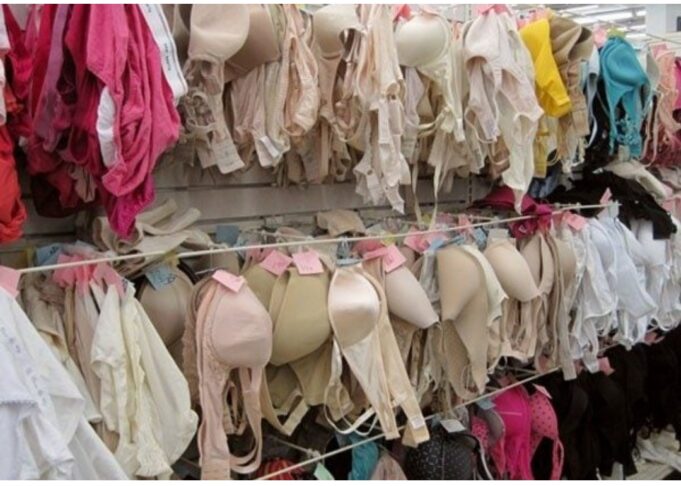Skin health experts have cautioned women against purchasing and wearing second-hand bras and pants, emphasizing the risk of bacterial infections and other health complications.
Dermatologists have particularly warned that women who wear such underwear without thorough washing and ironing expose themselves to higher chances of infections and skin reactions.
Acknowledging the economic difficulties that have increased the preference for second-hand clothing, commonly known as “Okrika,” the specialists advised women to prioritize their health by opting for new intimate wear.
In separate interviews, the experts noted that while soaking second-hand underwear in hot water, bleach, or disinfectant may help, there is no solid scientific proof that these measures completely eliminate the risks.
Already, over 20 million Nigerians are infected with hepatitis, a viral disease that inflames the liver.
Another concern is herpes, a contagious virus that causes painful sores on the mouth and genitals and spreads through skin contact. While treatable, herpes has no known cure.
A report by DAILY GAZETTE highlighted that economic hardship has pushed many Nigerian women, particularly in Lagos, to purchase second-hand bras and pants.
While the second-hand clothing market has long been popular, the surge in demand for intimate wear due to affordability is a recent trend.
Sellers of second-hand underwear boast of increased patronage, while buyers cite high costs of new underwear as the primary reason for turning to thrift options.
However, many users do not fully consider the health risks involved.
Providing expert analysis, Dr. Nafisatu Abdullahi, a Consultant Dermatologist and Venereologist at the Federal Teaching Hospital, Katsina, stressed that second-hand underwear—whether locally exchanged or imported—carries significant health risks.
She explained that underwear passed from one person to another within a short period could still contain organisms capable of causing diseases, especially if not properly washed.
Dr. Abdullahi further pointed out that even imported second-hand underwear, which takes longer before reaching a new user, poses risks of fungal infections.
“Getting previously used underwear from neighbors or relatives presents a few different health challenges compared with getting one that is coming, let’s say, all the way from China. Not necessarily because of the different skin colors but because of the time frame that they were last used,” she explained.
“Some of the adverse health implications for those who use previously used underwear include contracting fungal infections. This is because fungal organisms are known to have spores that can last for weeks and months lying dormant, waiting for the right environment to reactivate and cause infection.”
She added that wearers of second-hand underwear could also develop parasitic infections such as scabies and pubic lice.
Dr. Abdullahi further warned that wearing underwear recently used by another person without proper washing increases the risk of viral infections such as hepatitis or herpes.
“In the same vein, those that were used recently without proper washing put the wearers at risk of bacterial infection like E. coli and staphylococcus,” she stated.
She emphasized that the safest option remains wearing brand-new underwear. However, for those who insist on using second-hand underwear, she offered some precautionary measures.
“When you are given or buying fairly used underwear and can see a visible stain or perceive an odd smell, it is better to avoid those kinds of underwear.
“If it is possible to wear panty liners, it is better and safer compared with using the panties directly. Every previously owned item, including pants and bras, should be washed in hot water with bleach or another strong disinfectant, dried preferably in the hot sun, and thoroughly ironed.
“If you do all these and still develop a rash, itching, or any discomfort, it is best to see a dermatologist or doctor as quickly as possible,” she advised.
Another dermatologist, Dr. Olutomidimu Afolabi, highlighted additional health risks associated with wearing used underwear, stating that they have direct skin contact, increasing the chances of contracting infections, including sexually transmitted diseases.
She warned that wearing such underwear could expose individuals to hepatitis B and C, which are transmitted through blood, sexual fluids, and sweat.
“People get hepatitis from sharing clothing. Now I’m not even talking about underwear—just sharing clothes. Some people might want to argue that they will wash it with hot water and iron it. There is a need for more studies to show whether this has an effect. But some people wear these clothes and underwear without washing,” Dr. Afolabi said.
She acknowledged the economic challenges that push people toward second-hand clothing but strongly discouraged the use of thrift underwear due to the serious health risks involved.
Speaking on the dangers specifically faced by women, she explained, “When females have candida, that’s vaginal candidiasis (vaginal yeast infection), there’s whitish discharge, and part of the treatment is for the person to change their pants to prevent re-infection. Buying and wearing such disposable pants can pose an infection risk to the new user.”
Dr. Afolabi urged women to prioritize their health by purchasing affordable new underwear rather than taking risks with second-hand options.

















